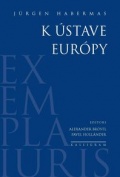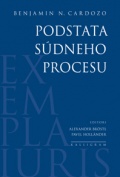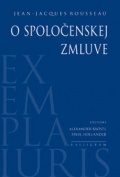Exempla Iuris
-
Právna logika - nová rétorika

Od Norimberského procesu, ktorý ukázal, že štát a jeho legislatíva môžu byť nespravodlivé a dokonca zločinné, sa nielen v radoch tradičných stúpencov prirodzeného práva, ale aj u väčšiny právnych teoretikov prejavuje antipozitivistická orientácia. To pri interpretácii a uplatňovaní zákona vedie k čoraz väčšiemu zdôrazňovaniu potreby hľadať riešenia, ktoré nielenže sú v súlade so zákonom, ale sú aj primerané, rozumné a prijateľné, skrátka riešenia spravodlivé, a pritom zodpovedajúce platnému právu. Hľadá sa také riešenie, ktoré sa začlení do systému, a navyše bude spoločensky a morálne prijateľné pre zainteresované strany a poučené publikum.
Autor: Chaïm Perelman -
Právo národov

Slovenské vydanie Rawlsovej práce Právo národov je doplnené o štúdiu Revidovaná idea verejného rozumu, ktorá bola súčaťou rozšíreného vydania Práva národov z roku 1999.
Rawls vychádza z toho, že „národy“(peoples) a nie štáty sú základnou jednotkou skúmania. Podľa neho skupiny národov, ktoré tvoria štáty, majú sledovať princípy, ktoré rozpracoval v známom diele Teória spravodlivosti. Demokracia sa mu zdá byť najlogickejším prostriedkom na naplnenie týchto princípov, avšak aj benígne ne−demokracie, ktoré nazýva „konzultačné hierarchie“, by sa na medzinárodnej scéne tiež mali považovať za prijateľné. V tejto súvislosti rozpracúva osem princípov, na základe ktorých by národy na tejto scéne mali pôsobiť (napr. národy sú slobodné a nezávislé a ostatné národy musia rešpektovať ich slobodu a nezávislosť, národy sú si rovné ako zmluvné strany, národy si ctia ľudské práva, národy majú právo na sebaobranu, ale nie právo na vojnu).
Autor: John Rawls -
Regarding the European constitution

The ongoing Euro crisis, as well as the half-baked, often populist reactions by politicians, has resulted in a situation when the failure of the European project currently seems as a realistic possibility. In his essay Jürgen Habermas defends Europe against the spreading scepticism, arguing with new convincing emphasis on the European Union, its history and future in particular. It breaks down prejudices in thinking in relation to the trans-nationalisation of democracy by including the unification process in the long-term context of jurisprudence and more civilised public power. Ultimately Jürgen Habermas challenges politicians to change the European project, which so far has been progressing behind closed doors, to an immediate mode of transparent decision-forming struggle in the public arena.
In addition to the Regarding the European Constitution essay, this volume contains a chapter The concept of human dignity and a realistic utopia of human rights from year 2010, as well as three interventions which Jürgen Habermas published since the onset of financial crisis.
Author: Jürgen Habermas -
SUBSTANCE OF COURT PROCESS

“The spirit of times, as it reveals itself to every one of us, is often only the spirit of the group where we happened to find ourselves by coincidence of our birth, education or employment, or friendship. No amount of effort or revolution of the mind will discard totally and forever the empire of these subconscious loyalties (...) We are hopelessly trusting by nature and we instinctively accept verdicts by the group. We are haughty, not only when under the curse of feverish crowd, but we listen everywhere and always to the soft voice of the herd and we are always ready to defend and excuse instructions and warnings and to accept them as mature results of our own considerations. This was not written especially about the judges but about the men and women of all classes. The judge’s training, if involving something referred to as the court temperament, will assist him to a certain degree to free himself from the suggestive power of individual dislikes and prejudices. (...) However, as long as the human nature is the way it is these loyalties will never fully vanish. Sometimes we can wonder how the confluence of all powers of individualism can produce something coherent, something else than chaos and ineffectiveness. These are the moments when we overstate the component of difference. At the end they will give rise to something which has organization, and the truth, and order.”
Author: Benjamin N. Cardozo -
ABOUT THE SOCIAL CONTRACT or about political law principles

“The oldest and the only natural of all societies is the family. However, the children retain their bond with their father only as long as they need him for their lives. As soon as this need no longer exists, the natural bond is broken. The children absolved of the duty to obey their father, the father has no longer the duty to look after the children, and all become equally independent. If the bond remains intact, it is not as a result of natural process, but it is voluntary and the family sustains itself only based on an agreement.
This common freedom is given by the natural origin of a man. Its first law is to maintain the self-preservation, its first concerns are obligations towards oneself. As soon as we reach the age of reason, we are becoming our own masters and we ourselves evaluate the means suitable for self-realisation.
Hence, the family is the first example of political societies: the head of state is the image of a father, the population is the image of children, all are born equal and free and they give up their freedoms only for their own benefit. The difference lies only in the fact that in a family the father's love and care of his children is rewarded, but the head of state has no such love towards its people and this love was replaced by indulgence in power.”
Author: Jean-Jacques Rousseau
News
-
SOUKENÍK - ŠTRPKA Law Firm Defends and Strengthens Its Positions in THE LEGAL 500 International Rankings
- Publikované
- 27 MAR'24
SOUKENÍK - ŠTRPKA Law Firm Defends and Strengthens Its Positions in THE LEGAL 500 International Rankings. ...
-
1st DONOR CONFERENCE ORGANIZED BY SOCIETY ÚSMEV AKO DAR
- Publikované
- 22 MAR'24
The partner of the law firm SOUKENÍK - ŠTRPKA, Lukáš Štefánik, attended the 1st donor conference organized by Society Úsmev ...
-
ROZHOVOR: UMENIU, AKO SA UČIŤ, HO NAUČILA VYSOKÁ ŠKOLA - PRETAVENIE VZDELANIA DO PRAXE
- Publikované
- 31 JAN'24
Partner advokátskej kancelárie SOUKENÍK – ŠTRPKA, predseda Správnej rady UK a člen Alumni Klubu PraF UK Miroslav Hlivák ...
-
SOUKENÍK – ŠTRPKA UŽ SIEDMYKRÁT V RADE NAJVÄČŠOU PRÁVNICKOU KANCELÁRIOU NA SLOVENSKU
- Publikované
- 27 NOV'23
Siedmykrát v rade sme získali 1. miesto v rebríčku The Slovak Spectator najväčších právnických kancelárií na ...

